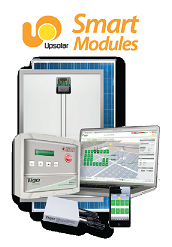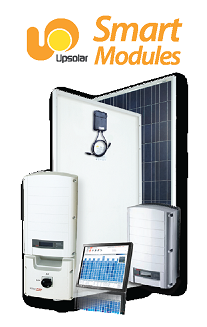Upsolar: innovative smart modules and developments in the solar industry
Upsolar, a leading developer and producer of PV modules, has offices across Europe, Asia, Australia and the Americas, and is helping to accelerate global solar energy adoption. Climate Action caught up with Upsolar's CEO, Mr. Zhe Jiang, to find out more about how smart modules are reducing costs and promoting renewable energy expansion.

Upsolar, a leading international developer and producer of solar photovoltaic modules, is utilising top-tier module components to provide innovative, tailored PV technologies to the market.
Expansion in the European renewable energy market, the cost effectiveness of new smart modules and global energy security issues are high on the agenda and Climate Action caught up with Upsolar's CEO, Mr. Zhe Jiang, to find out more.
Upsolar was named winner of GoingGreen Silicon Valley Global 200 in November 2012. Could you tell us more about the award and the innovations and approaches that Upsolar are demonstrating to gain this kind of recognition?
It was an honor to receive AlwaysOn’s GoingGreen Silicon Valley Global 200 award, which recognises companies demonstrating “game-changing approaches and technologies that are likely to disrupt existing and entrenched players in green technology.” Upsolar received AlwayOn’s GoingGreen award for our vertically integrated “Excellence at Each Step” manufacturing technique. Our unique process guarantees that we deliver modules that exhibit optimal performance and reliability at every phase of design and production.
The AlwaysOn editorial team bases its three-month selection process on the criteria of innovation, market potential, commercialisation, stakeholder value and media buzz.
Upsolar’s Tigo Energy smart modules are now available on the UK market. Could you tell us more about the product and what its availability could mean for the solar industry in the UK?
The UK residential solar market presents unique challenges for solar energy. The abundance of homes with small, cramped roofs, hindered by patches of shade, along with continued skepticism around the financial benefits of solar translate into a tough market for solar in the UK.
"Smart module technology enhances the flexibility of system design, eases installation process and reduces balance of systems costs"
Upsolar’s goal is to surmount these obstacles in the UK. Our solution: smart modules, which integrate Upsolar’s modules with Tigo Energy’s power optimisers. Through our local distribution partners, we offer smart modules that maximise individual energy harvest. Additionally, the smart modules directly integrate safety features and real-time monitoring capabilities, allowing customers access to detailed performance data. Smart module technology enhances the flexibility of system design, eases installation process and reduces balance of systems costs, making this an ideal technology to address the concerns of shaded and cramped roofs in the UK.
Upsolar is now offering its full suite of modules to customers in Serbia and Croatia. What is the main reason behind this expansion in the Balkans and what further markets will Upsolar be involved with in the future?
Entry into the Balkans enables Upsolar to further expand its reach within promising markets in Eastern Europe. In 2013, the Serbian and Croatian markets are expected to reach 10 MW and 15 MW of installed solar capacity, respectively, up from just 100 kW and 8 MW at the end of 2012. This phenomenal market growth is in part due to the countries’ motivation to catch up with Western Europe in the development of renewable energy sources. Our expansion in the region has also been closely tied to our ability to find trusted partners, such as Plan-net Solar.
Over the coming year, we will focus on building our presence in these promising regions while supporting the development of Eastern European markets. Outside Europe, we have recently opened an office in Australia, and expanded our sales presence to South America—two additional areas poised for rapid growth and long-term market success.
Upsolar's smart modules have been heralded for their system performance but also for reducing BOS costs. How does the product achieve this and how important is reducing this cost?
Our smart modules incorporate the ‘Vlimit’ function, which limits the voltage of each module to a maximum specific value (1.06 x Vm). This gives the smart modules a Voc lower than standard modules, allowing the connection of more modules per string. This in turn enables the use of less combiner boxes, cables, inverters, and other accessories compared to standard installations. This reduced BOS cost makes the overall smart module system more affordable, driving the widespread adoption of the technology.
Upsolar has gained recognition for the long-term performance and durability of its products. Could you tell us more about how this has been achieved and how crucial this is?
Solar energy installations are a multi-decade investment, which means that long-term performance and durability is paramount to the viability of any market. At Upsolar, our “Excellence at Each Step” philosophy serves as the foundation of our quality assurance from the lab to the field.
"Our “Excellence at Each Step” philosophy serves as the foundation of our quality assurance from the lab to the field"
Each of our components meets rigorous IEC standards, with above-average performance in tests related to accelerated aging. Upsolar also ensures offline quality control (QC) to monitor the stability of production quality on modules sampled from the manufacturing line.
Additionally, the company collaborates with well-regarded and highly reliable technology partners, such SolarEdge Technologies, Tigo Energy, and Enphase Energy. We have also received recognition from respected third parties like Öko Test and Photon Laboratory to verify the exception performance of our modules.
The Italian market is regarded as one of the most promising in terms of renewable energy growth in Europe. Could you explain why this is and what success Upsolar is having in the Italian market?
Italy is a promising market for renewable energy expansion and has stabilised in the last few years. Consistent growth is key to long-term success in the solar market, which is why Upsolar chose to establish one of its largest regional teams in Italy.
Upsolar offers a variety of benefits to its customers in Italy. For example, we provide customised financing solutions to customers who wish to install a solar electric system without the added complications of working with a bank to access funding. Additionally, customers can access the Italian solar feed-in tariff through the use of our modules equipped with Solrif® frames from Schweizer.
We also understand that safety is also highly important to our customers. To this end, we recently received a fire resistance certification by meeting “Reaction to Fire Class 1” regulations set forth by the Fire Prevention Laboratory Spa of Italy. This certification ensures that installed modules are equipped to prevent the spread of fire, and Upsolar’s modules now qualify for use on roofs in Italy requiring these specific security parameters.
Finally, we are pursuing project development opportunities in Italy, including our joint venture—Energia Verde Investimenti 3 (EVI3)—for a 1 MW installation in the Bologna Province. Overall, we feel that Italy presents a great environment in which Upsolar will continue to grow.
Upsolar’s Life Cycle Assessment (LCA) ensures that products environmental impacts are taken into account at all stages. Can you explain more about the LCA and its importance?
A Life Cycle Assessment (LCA) assesses the environmental impact at each stage of a products’ manufacturing, distribution, installation, utilisation, and end-of-life. By taking into account the end-to-end environmental consequences, the LCA has allowed Upsolar to monitor and reduce its carbon footprint accordingly.
The LCA also enables our clients to understand the environmental performance, implications and associated emissions involved in the use of Upsolar’s modules, seeing first-hand the quantifiable benefits of solar energy over conventional fossil fuels, and allowing for an educated comparison between various modules. The LCA serves as a tool for Upsolar to assess environmental performance at an individual life stage, allowing the company to pinpoint a strategy to reduce its environmental impact, in order to stay consistent with the company’s environmental values.
Corporate social responsibilities and sustainable development goals are given considerable attention by Upsolar. Could you explain the resources that go into these and why they form such a key element of Upsolar’s operations?
Upsolar strives to set an example of a responsible international enterprise through its CSR and sustainable development goals. With solar playing an integral part in global sustainable development, Upsolar aims to contribute to the health of the industry by strictly complying with industry standards and regulations.
Last year, the company established its Corporate Social Environmental Responsibility (CSER) department to better address social and environmental issues internally through an education initiative. Upsolar integrates CSER into operations through sponsorships and plans to continue internal auditing, which it began last year with the company’s LCA. The auditing will occur on an annual basis to compare and improve performance.
Energy security is now an urgent issue facing the world’s population. How is the solar industry and Upsolar particularly addressing this problem and what are the plans in place in a new era of solar, renewable energy?
Solar and renewable energy address the issue of energy security by reducing reliance on environmentally, economically and politically volatile fossil fuels. Additionally, the distributed nature of renewable energy stabilises the electricity grid in the face of natural disasters or unsustainable peaks. By making solar energy accessible and affordable for clients, and convenient for the company’s partners, Upsolar encourages the widespread adoption of solar technology.
To address energy security in the future, Upsolar will continue to partner with innovative and reliable partners to develop modules with the top ‘quality-to-cost ratio’ on the solar market, while integrating emerging innovations in solar PV.



_400_250_s_c1.png)




